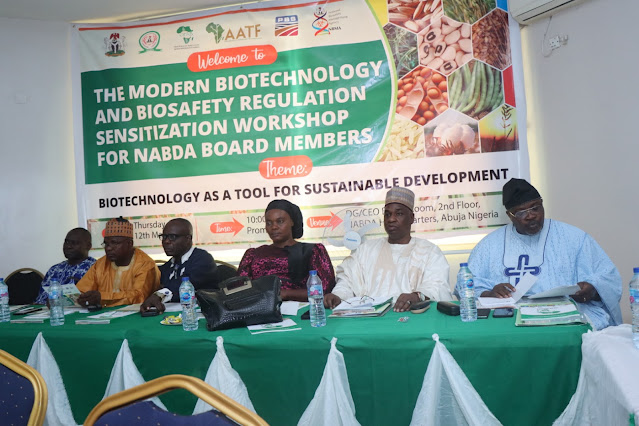President Mohammed Buhari has signed into law the 2022 National Biotechnology Development Agency (NABDA) establishment bill which by provision has empowered it to be able to research more into genetically modified technology crops towards food security.
This was disclosed by the agency’s big boss, Prof. Mustapha Abdullahi recently at a sensitization workshop held for the agency’s board members for the purpose of more familiarization to the new research Institute.
Prof.
Abdullahi said the new act has now recognized the agency as a full-fledged
research institute with more power to carry out more research on genetically
engineering technologies for food improvement and security.
Prof. Abdullahi said that the signing of the bill into law was a reflection of commitment of this administration to economy repositioning with proactive agricultural new technologies, adding that “In April 2022, President Muhammadu Buhari signed the NABDA Establishment Bill 2022 into Law and this has since been officially gazetted as the Act has expanded NABDA’s scope of activities’’
“The act now
fully recognised NABDA as a research institute with the mandate to create
awareness, coordinate, facilitate, deploy, domesticate and carry out research
in all areas of biotechnology for the development of the nation’’
Mustapha
stressed said the successful implementation of biotechnology engineering laws
in Nigeria would bring about significant benefits to farmers, and as well aid
rapid economic transformations.
According to
him “I am so optimistic that these activities have the potential of improving
the quality of life and create job opportunities for the people,’’ “This is
similar to economic transformations currently experienced in Argentina, Brazil,
India, Sudan, Togo, Ethiopia and South Africa that have all adopted this modern
approach to boost their food and cash crops production.
“It should
be noted that the adoption of higher yielding biotech crops by farmers across
the world, continue to deliver substantial agronomic, environmental, economic,
health and social benefits to farmers and entire society’’ said he.
















No comments:
Post a Comment